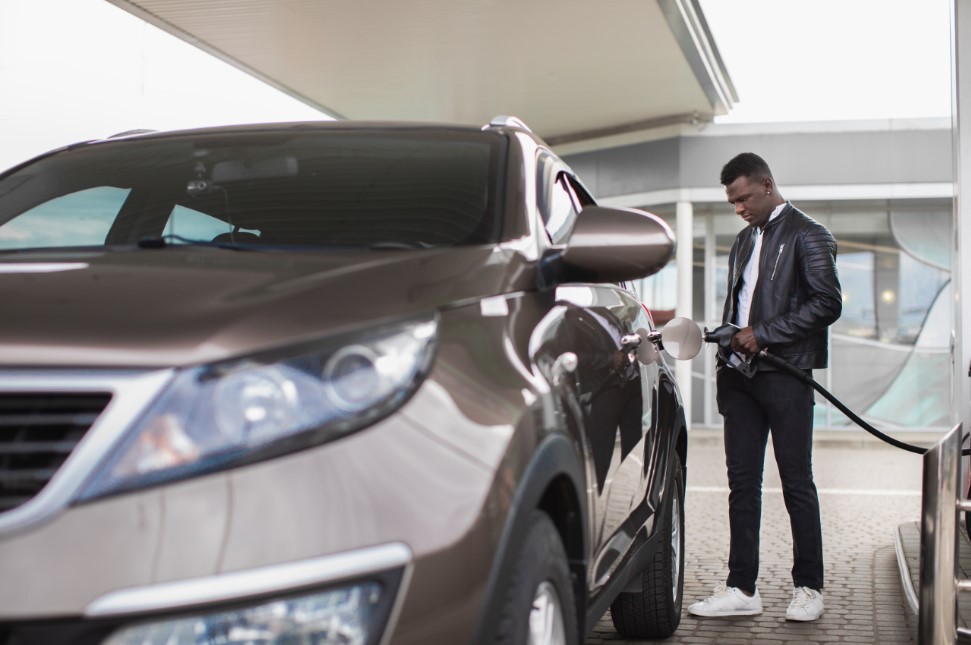Women of Auto Repair: International Women’s Day 2019
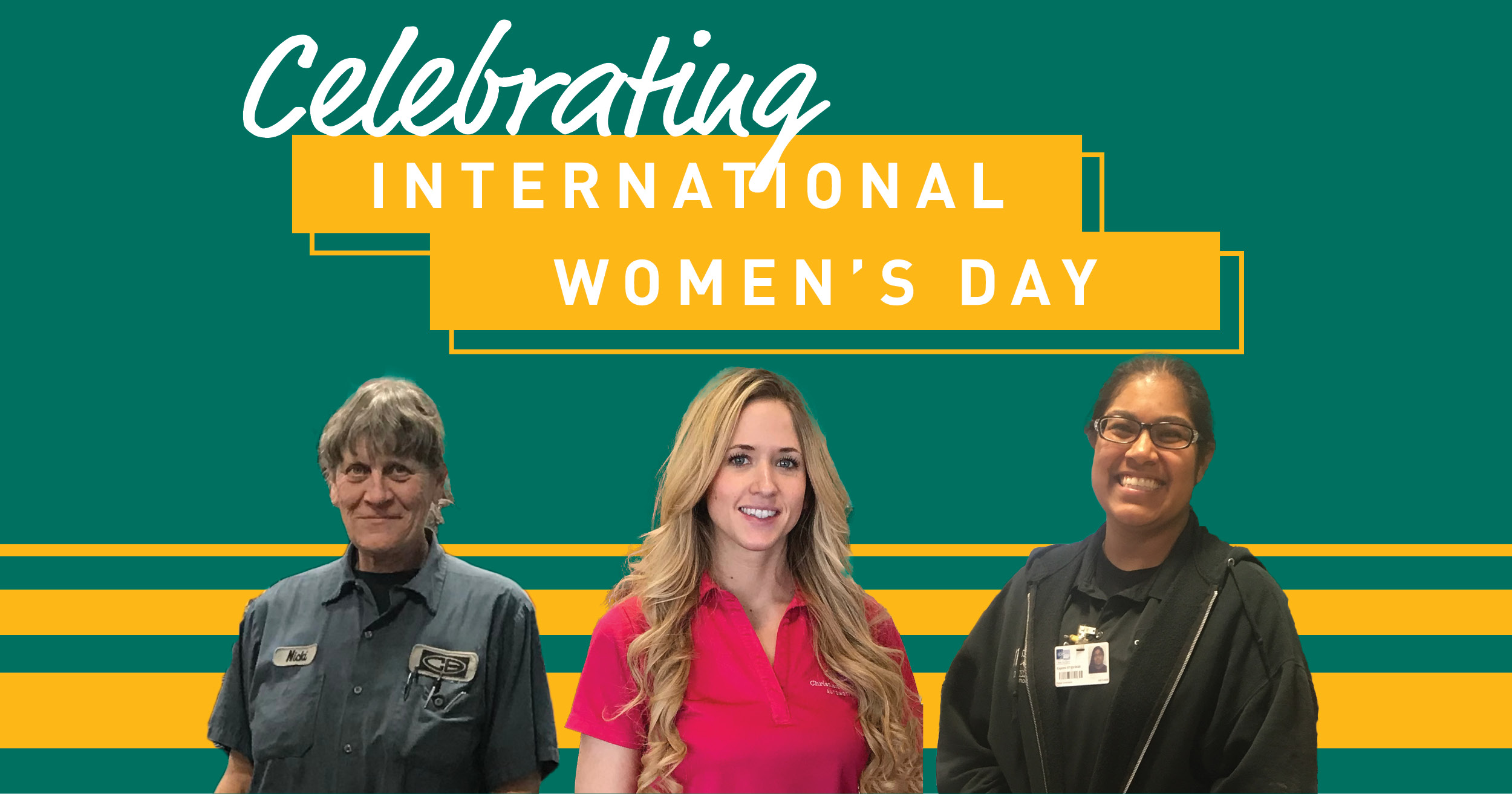
Communities thrive when men and women equally share roles and responsibilities. In honor of International Women’s Day, we’re celebrating 3 women making the automotive repair industry #BalancedForBetter. Not only are they breaking barriers, but they’re inspiring the next generation of automotive repair. Read their stories and get to know some of the women behind CBA.
Diana, Technician
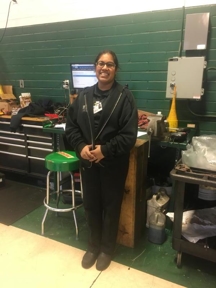
How did you get into your trade as a technician?
It really started out with me drawing cars. My dad had a ‘64 Impala, and he never drove it, but I loved that car. I drew it from every angle you can think of. A lot of my cousins and family members were mechanics, they would work on cars, and they knew to fix their own cars.
How did you end up doing this professionally?
My dad taught me what little he knew about fixing cars, so I learned how to fix the brakes, give oil changes and tune-ups from him. I’m glad my parents were supportive of what I wanted to do. The rest of the family didn’t support me at all.
As I grew up, I tried doing things on my own. My first job after high school was at a call center; I knew I didn’t like it from day one. I was going to school to become an automotive technician and told myself to start applying anywhere, so I applied to a parts store. I received a call a week later and was hired. That’s how it all started.
What is it about this industry that really gets you excited? Why did you become a technician?
I like how everything is changing. I hate monotonous work. I love being able to work on my car. I love that I’m almost entirely independent. This career allows me to pay all of my bills without help from anyone else. I love that if I break down for any reason, I can fix it. I don’t have to call someone and wait for roadside assistance for 5-hours.
What have been some of the more significant challenges you’ve faced while working in a predominantly male industry and how did you overcome them?
The biggest challenge has been making people believe that I can work on cars. I mentioned that I started out at AutoZone, and even after I had been there for several years, there were times when a customer would tell me that they wanted to speak to a man. My name-tag showed that I was ASE certified and they would still want to talk to a man.
Sometimes customers think that I can’t fix cars because I’m a female. They feel like I can’t do what my male co-workers can do. But I can. We, women, can do anything!
How do you deal with people like that?
I’ll help them. I’ll always assist them because that’s what I like to do. If I start explaining parts and what they do and how it affects their car, the customer is usually more comfortable with me fixing their vehicle. I have to let customers realize that I know what I’m doing.
How do your female customers react to you being their technician?
Positively! They’re always saying “Girl power!” and “You go girl!”. A lot of them do a little sigh of relief because they feel like I understand them and I won’t rip them off. The reaction from male customers can sometimes vary. Male customers are usually surprised.
In my experience, female customers have been a lot more appreciative. They’re more trusting, and they like the fact that I’ll explain what needs to be done to their vehicles. I don’t just tell them what’s wrong, but also why they need to fix it. Simple things like that help a lot. The bill might be high because there’s a lot of work getting done, but they feel better because they know what’s getting done and why.
I think it’s crucial for women and little girls to see women working in a shop. Most labor jobs see a large number of men in the field, there are very few women. Other women and young girls need to see that they can do those jobs just as well men.
How can we increase interest among women in car repair? How do we introduce them to the field and how can we encourage them to pursue this industry?
I think it starts in high school. Schools push cosmetology courses to the girls and automotive courses towards the boys. They should push kids to choose whatever class they find interesting instead of forcing them on a specific path because of their gender.
Working on cars is a skill that will always be needed. Always. Once you learn the skills, you’re able to be independent. You won’t need to ask anyone else to fix your car. Even if you don’t do it full-time, you can do it on the side and make money.
This industry allows women to be independent. Automotive repair is not a fad. It’s been around forever, and we need more mechanics so we can continue to help people. There aren’t a ton of young people working on cars anymore.
Megan, Service Writer
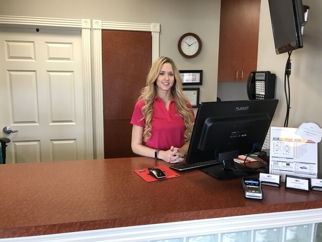
How did you get into the automotive repair industry?
My dad is a mechanic, and it was always his philosophy that we would save money by doing our own repairs. It was a great financial lesson that he taught me and because of that I never had to spend too much money. Plus, I’ve owned a lot of broken down cars.
Growing up, did you know women who worked in automotive repair?
Yes, I grew up in a tiny town in the middle of the country, so it was normal for women to do these types of things. I didn’t see a lot of surprise from others until I got into the industry. A lot of customers are surprised and sometimes uncomfortable with trusting me with their vehicles. Usually, after the initial shock wears off, the customer comes around and warms up to me.
"When customers come in, they’re a little disoriented. A lot of them will ask to speak to someone else. And by someone else, I think they mean a man. I have to make them comfortable so that they are willing to talk to me about their vehicle. I have to do a little bit of proving myself when it comes to my knowledge, more than a man does."
You’re a service writer, correct? Tell me about your day-to-day.
Work is fast paced. I come in and open up the store and help to set the appointments for the day. As customers come in, I look over our technician’s reports and build the estimates with parts. I find out which vendors have the best prices, and then I negotiate on the labor that’s going to be necessary for each ticket. I follow the tickets, line up shuttle rides and coordinate schedules between people. I’m basically the liaison between the customers, the vendors and our team at the shop.
What drove you to pursue this profession and what’s keeping you here?
Knowing how to work on your own car or even just knowing how to maintain your own car is a valuable gift for any woman. Since I was taught how to do these things when I was younger, it’s sad to know that a lot of people don’t also have this knowledge.
"I’m always surprised that people, specifically women, don’t know how to maintain their own vehicles. So what keeps me around is having the chance to educate people."
You had prior experience fixing cars. How did you make your move to the front counter?
I went right into working at the front desk, which was kind of disorienting at first. Just because I knew how to work on my car, didn't mean I could fix all vehicles. I definitely had to learn about other people’s cars. My manager at the time was very good about teaching me the right types of parts to get for certain cars, and which cars needed specific procedures. I think one day I might want to work on cars and actually be in the bay, but that would require a lot more training.
What have been some of your biggest challenges while working in a male-dominated industry and how have you overcome them?
I think just having the customer trust and believe in me is one of my biggest challenges. My male co-workers have been great about not having a wall between us. They treat me normally. It’s usually the customer who has the barrier, and I have to work to get past it. The hardest part is to know that from the moment they meet me they’ve already made a snap judgment on whether or not I should be doing my job. Then, I have to prove them wrong. It just takes a little bit of extra time.
How do you break down that barrier?
Some customers prefer to work with men, and there’s little I can do about it. Most of the time I’ll try to explain that I’m here to help and I want to understand their issues. Once they give me more information, I do my best to provide them with my knowledge without being too technical about it. We’ll go out to their car, and they’ll explain what’s going on. I try to be as helpful as I can so that they know I’m here to do just that. Once they see that I know what I’m doing, they’re more trusting.
Why do you think it’s essential that we continue to have women enter these industries?
We need women who are willing to learn and teach. We need women who know that they’re just as capable of being successful in this industry as any man. I think this will change the way we think of women in the field.
"If more women are working in the industry, then they’ll spread that knowledge to their mothers, daughters, aunts, friends, etc. That's the way we’re going to get to more women to learn about automotive repair - by having them in the field."
What would you say to someone curious about working at an automotive repair shop? How would you encourage them to take the plunge?
I’d tell them that this industry is not just an education that they will value for life, but it’s also an industry that’s exciting, always changing, fun and it’s a skill that will be utilized forever. Whether you work in this for six months or six years, it’s a good time, and it’s knowledge you’re never going to regret having.
Nicki, Technician
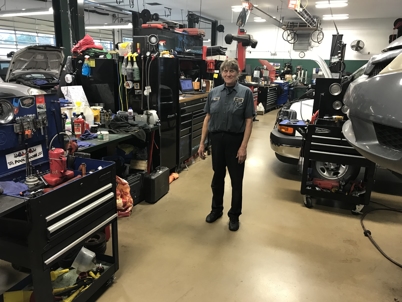
How did you get your start as a technician?
My father owned a marina, and he had a repair shop there. I was small enough to touch the engine of a big boat. He was 6’6'' and couldn’t make it.
While my dad was an engineer, It was really my grandfather who introduced me to this world. He was an innovator. He helped with the process that makes airplane wheels move up and down. He made the controls for a secret submarine. He worked in the hydraulic industry.
"As a teenager I needed my car fixed and was told I had to pay a very high price to have something simple done at a dealership. I got mad and started taking automotive repair classes at school so that I could fix it myself. Back then, I was the only girl in the class."
What was it like being the only girl in your class?
My teacher was kind of like “what are you doing here?!” I was an outsider in the class, and later, an outsider where I worked. Even today, women are looked upon as strange for being in the industry.
What is it about this industry that made you want to fix cars professionally?
I loved doing it. In the ’70s, once I got into it, race cars were popular. Drag racing was my love. I built the car to do the quarter-mile.
When I first began my career, it was a part-time job and I only worried about having fun. I worked at parts stores here and there because no one would hire me at a garage. Women working in a garage during the late ‘70s and early ‘80s were seen as very strange. The only way I could get the job at the parts store is if I agreed to work at a fast-food restaurant. The man who owned the store also owned the restaurant. So that’s what I did to get my foot in the door.
"Once the owner discovered that I was more knowledgeable about parts than he was, I started working solely at the store."
All of the garages in the area got to know me through that store which let me jump from the store to the garage. At the time, no one in that town knew about ASE (automotive service excellence). I was the only one ASE certified in that town and my shop was the first ASE Blue Seal location in the area.
How did you land at Christian Brothers Automotive?
One day, I got a phone call from Tom, the owner here. He heard about me from one of the parts stores I supposed. He offered me the job.
What has your experience been like since working at the shop? How has it differed from other places?
We have a family atmosphere here where everyone pitches in to help. We’re always looking out for each other. The line of communication here is excellent.
The availability of diagnostic equipment is greater here compared to other shops. When I worked at other shops, I noticed that if you didn’t have your own equipment, then you were out of luck.
Earlier you mentioned that it was hard finding a job as a female technician. What other challenges have you faced while working in a male-dominated industry?
I always have to prove that I know what I’m doing. I think a lot of people feel like men can do this work and women can’t. It’s always been this way and probably always will be. Women will always need to prove that we have the knowledge to do the work.
How did you prove that?
I learned that I had to describe things in a way that people would understand, especially if they didn't know anything about cars.
What has your relationship been like with your female guests? Do you think your gender has affected their customer experience?
"I believe so. I think female customers feel safe when I explain what issues need to be addressed and how we'll fix them. Even my male customers open up after having a chance to talk with me."
You were lucky to have family members introduce you to engines and repairing machines. If someone isn’t there to expose women to this line of work, where can they go to learn more about basic car maintenance and repair?
There are a lot of courses out there now. A couple of women have started groups where they teach basic car maintenance. I’ve taught a few classes where I’ve had people bring in their Owner’s Manual. We went over what it means when different lights come on in the vehicle along with how to perform minor repairs.
There also has to be more availability at the high school level. I remember going to a school and talking to 7th and 9th graders about my job. The most recurring question was about breaking into the industry.
I told them to just go out and do it! Most schools, if you’re in a big enough area, have an automotive class. If not, there are tech schools available. Almost all tech schools have some sort of automotive class.
"I think society has put roles into our heads. It tells us that men should be mechanics, not women. We have to overcome that. It’s going to get easier."


[1].jpg)
sunwash-tech-with-customer.png)
